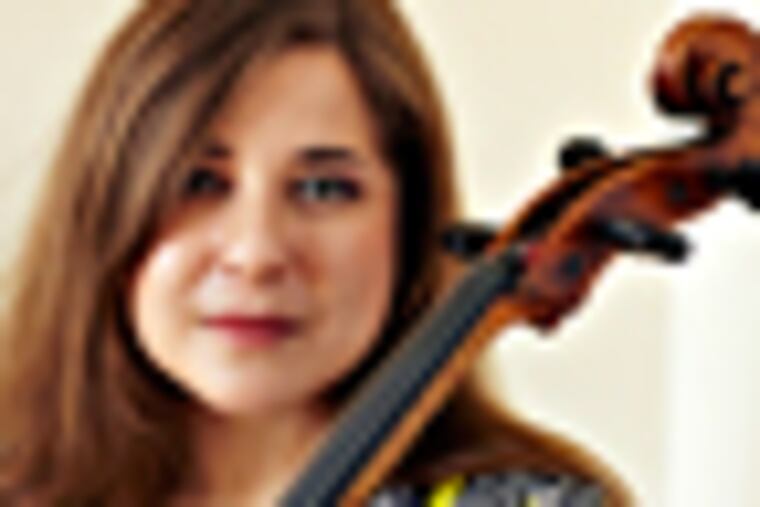Cellist found her own path to performing concerto
Part protest, part lamentation for a lost era, the Elgar Cello Concerto confronts whoever plays it with a challenge beyond music: Is there any other way but Jacqueline du Pré's?

Part protest, part lamentation for a lost era, the Elgar
Cello Concerto
confronts whoever plays it with a challenge beyond music: Is there any other way but Jacqueline du Pré's?
The blond, charismatic British cellist owned the piece throughout the 1960s during her brief international career, but it leaves young musicians such as Alisa Weilerstein with the problem of finding their own path.
"I was kind of obsessed with her. I had a poster of her on my wall. I could quote her interviews. I saw every single bit of film footage on her by the time I was 10," said Weilerstein, now 30, who is playing the Elgar concerto with the Philadelphia Orchestra on Thursday through Saturday at the Kimmel Center. "But when I started to learn the concerto on my own, I had to put the recordings away. They were so seductive."
A frequent visitor to Philadelphia in recent years, Weilerstein has happily filled in for ill colleagues, made a download-only recording of the Shostakovich Cello Concerto No. 1 with Christoph Eschenbach, braved the summer heat playing at the Mann Center, and tried out her New York recital program at Reform Congregation Keneseth Israel in Elkins Park. She even played the Elgar concerto at the Kimmel Center on a tour stop with the New York Philharmonic.
The difference this week is that she comes to the concerto having recorded it, on the first disc of a major contract with the Decca label, with none other than Daniel Barenboim, du Pré's husband. He also conducted du Pré's later Elgar recording with the Philadelphia Orchestra, released after her 1973 retirement at age 28 due to multiple sclerosis. She died in 1987.
The collaboration came about by chance. Any young musician is likely to stalk a now-old master such as Barenboim, who is based in Berlin and Milan. Weilerstein, who has been favorably compared to du Pré for years, met him in December 2008 (just before her Elkins Park recital) on orders from fellow conductor Asher Fisch. Backstage at the Metropolitan Opera, Fisch didn't even ask Barenboim. "He said, 'You're going to hear her tomorrow,' " recalls Weilerstein. "Barenboim looked at him like, 'Do I have to?' "
She played Dvorak for him; he was impressed and invited her to work with him again. Out of reverence for du Pré, Weilerstein made up her mind that she would never, in those work sessions, play Elgar. Since du Pré's decline and death, Barenboim had conducted the concerto only once - and had also suffered the humiliation of being portrayed in the 1998 hit film Hilary and Jackie, a sensationalized account of du Pré's life.
Yet it was Barenboim who invited Weilerstein to perform with him and the Berlin Philharmonic in a special televised concert in Oxford, England. " 'Do you want to do Elgar with me? Do you? Do you?' That's how he asked me, just like that," she recalls.
Luckily, Weilerstein is as sturdy as musicians come. A touring musician since age 14, she pursued a full-time concert career while earning a degree in Russian history at Columbia University. Early in her career, she zoomed around Asia, Europe, and America to go where the work was - not easy for cellists in post-9/11 security - while managing diabetes. But the night before the telecast, Oxford was jumping with May Day parties that had her arriving for the performance without having slept. She played well anyway, but quite differently from du Pré.
Though nicknamed "Smiley" by Barenboim because of her sunny demeanor, du Pré was high-octane in the extreme when playing cello, her steely, rhetorical interpretation of the Elgar reflecting the 1960s world turmoil around her. And while the composer meant for the 1919 piece to be a requiem of sorts for Edwardian England, du Pré disregarded the composer's request for nobility. Weilerstein's approach - enabled by Barenboim's advice on structure, fingerings, and longer phrases - is more integrated, more in the composer's world.
The strange, wandering unison theme that follows the concerto's opening gesture might easily be interpreted as Orpheus finding his way out of the underworld. Not for Weilerstein: "Elgar had an image for this. On his deathbed, he said that if you hear that theme when walking through the woods, 'it's only me.' "
The Elgar project with Barenboim also led Weilerstein to the doorstep of another legend, the recently deceased Elliott Carter, whose Cello Concerto fills out the Elgar disc. Barenboim is a big Carter champion, and as a result of learning the concerto for the recording, Weilerstein was coached by the 103-year-old Carter in what turned out to be his last interview before passing away in November. It's posted on YouTube.
Could her life be any headier? At least she knows she has earned it. Though she also received a MacArthur Foundation "genius grant" in 2011 (she banked the money until she decides what to do with it), Weilerstein had a gradual rise that caused her frustration in the past. "Now I'm grateful that the career thing went slowly," she says. "My boyfriend [Venezuelan conductor Rafael Payare] has a great expression: 'Slow down, I'm in a hurry.'
"I'm a whole person, a steady person. I have great friendships. I have concerts I want to play," she says. "Going at this fever pitch is not something I intend to always do. Playing 130 to 140 concerts a year, it's easy to get completely isolated and self-absorbed. But I want to play a lot. Always. That's what I like to do."